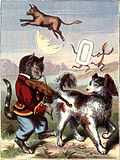Sticks and Stones (nursery rhyme)
"Sticks and Stones" is an English language children's rhyme. It persuades the child victim of name-calling to ignore the taunt, to refrain from physical retaliation, and to remain calm and good-natured.
First appearance
It is reported[1] to have appeared in The Christian Recorder of March 1862, a publication of the African Methodist Episcopal Church, where it is presented as an "old adage" in this form:
Sticks and stones will break my bones
But words will never harm me.
The phrase also appeared in 1872, where it is presented as advice in Tappy's Chicks: and Other Links Between Nature and Human Nature, by Mrs. George Cupples.[2] The version used in that work runs:
Sticks and stones may break my bones
But words will never hurt me.
Role in culture
This sentiment is reflected in/reflects the common law of civil assault, which holds that mere name-calling does not give rise to a cause of action, while putting someone in fear of physical violence does.
Author Tom DeMarco dedicated one chapter of his 2001 book Slack – Getting Past Burnout, Busywork, and the Myth of Total Efficiency to the phrase. There he writes about changes in organization that are only possible with the security, that people struggling with new ideas won't be laughed at. In comparison he says that fear (e.g. of breaking your neck) doesn't prevent people from learning. Bottom line for him: Words can actually hurt more than sticks and stones.
| Look up sticks and stones will break my bones, but words will never hurt me in Wiktionary, the free dictionary. |
Sources
- ↑ Gary Martin. "The Phrase Finder". Retrieved September 22, 2012.
- ↑ Cupples, Mrs. George [Ann Jane Dunn Douglas] (1872). Tappy's Chicks: And Other Links Between Nature and Human Nature (1872). London: Strahan & Co. p. 78.
